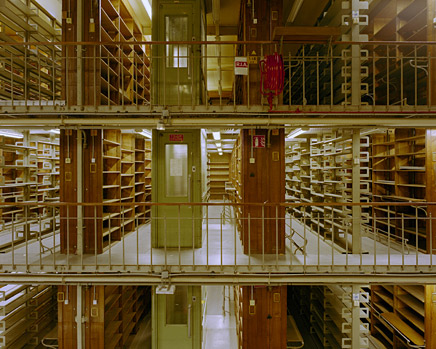removal: toute la mémoire du monde
libertà di informazione, accessibilità e custodia della conoscenza
trieste, studio tommaseo
E ovviamente, la linfa vitale della società dell’informazione è la libertà.
E’ la libertà che consente ai cittadini di tutto il mondo di fruire della conoscenza,
ai giornalisti di svolgere il loro fondamentale lavoro, ai cittadini di richiamare il governo alle proprie responsabilità.
Senza apertura, senza il diritto di cercare, ricevere e trasmettere informazioni e idee
attraverso qualsiasi mezzo di comunicazione di massa e indipendentemente dai confini nazionali,
la rivoluzione informatica si fermerà e la società dell’informazione che noi speriamo di costruire sarà nata morta.
Kofi Annan
REMOVAL (svuotamento), venerdì 18 aprile, ore 18, è un evento collaterale di FEST, Fiera internazionale dell’Editoria Scientifica di Trieste, co-prodotto dal Comitato Trieste Contemporanea e dalla Circoscrizione Friuli Venezia Giulia di Amnesty International, con il supporto della Regione Autonoma Friuli Venezia Giulia e con la collaborazione dell’ACM di Venezia e della Galleria EIGEN + ART (Leipzig/Berlin). Partecipa al progetto internazionale Continental Breakfast ed è realizzato a cura di Giulio Cok nella cornice di videospritz 2008, incontri con l’arte video internazionale. Ha inoltre l’adesione della Casa dell’Arte e la collaborazione del Centro UNESCO di Trieste e delle associazioni L’Officina e Studio Tommaseo di Trieste.

Toute la mémoire du monde/The world’s knowledge/Alles Wissen dieser Welt
There are indications of a time, when all riddles will be solved, a time, when this universe and others will deliver their keys. And this is simply because their readers, who are facing a piece of universal knowledge, will bit by bit find fragments of the same secret, that has a very beautiful name and calls itself felicity.
(in Alain Resnais movie "Toute la mémoire du monde", 1956)
The old Bibliothèque Nationale de France in the centre of Paris is currently vacant in major parts. The 11 floors of the stockroom and a capacious reading room are left unexploited.
In 1956 this library was the setting for a movie of Alain Resnais, the director of "Hiroshima mon amour” and "L’année dernière à Marienbad". In his 20 minute documentary "Toute la mémoire du monde” Alain Resnais shows how the library functions as a storehouse of the world’s knowledge; how, on an ordinary day books, magazines, plans and other treasures arrive, get catalogued and find their way into the archives, to be thus available for the reader in the reading room, who, as he says, internalises a part of the universal knowledge by reading and thus receives a "key”.
50 years later: We find the location vacated. An apocalyptic scenery. The knowledge has vanished. The pictures of the empty reading room and the empty stockroom immediately imply the loss of that "key”, the gateway to knowledge.
Analogous to the movie by Alain Resnais we filmed the location using slow tracking shots. In a double projection thousands of stocking room shelves without books flash by and in the reading room the camera merely captures a handful of young people, whiling away their time. Amongst the waiting people the withdrawal of knowledge provokes first signs of resentment, first signs of rebellion.
Nina Fischer, Maroan el Sani, 2006